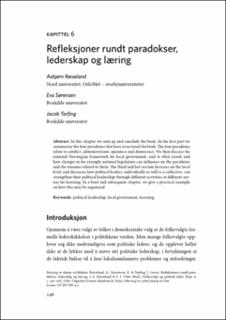| dc.contributor.author | Røiseland, Asbjørn | |
| dc.contributor.author | Sørensen, Eva | |
| dc.contributor.author | Torfing, Jacob | |
| dc.date.accessioned | 2021-01-06T11:12:17Z | |
| dc.date.accessioned | 2021-02-22T12:49:06Z | |
| dc.date.available | 2021-01-06T11:12:17Z | |
| dc.date.available | 2021-02-22T12:49:06Z | |
| dc.date.issued | 2020-05-18 | |
| dc.identifier.citation | Røiseland A, Sørensen E, Torfing J: Refleksjoner rundt paradokser, lederskap og læring. In: Røiseland A, Vabo SI. Folkevalgt og politisk leder, 2020. Cappelen Damm Akademisk p. 146-163 | en |
| dc.identifier.isbn | 978-82-02-65231-9 | |
| dc.identifier.isbn | 978-82-02-67918-7 | |
| dc.identifier.uri | https://hdl.handle.net/10642/9663 | |
| dc.description.abstract | In this chapter we sum up and conclude the book. In the first part we summarize the four paradoxes that have structured the book. The four paradoxes relate to conflict, administration, openness and democracy. We then discuss the national Norwegian framework for local government, and to what extent and how changes in for example national legislation can influence on the paradoxes and the tensions related to them. The third and last section focusses on the local level, and discusses how political leaders, individually as well as a collective, can strengthen their political leadership through different activities at different are- nas for learning. In a brief and subsequent chapter, we give a practical example on how this may be organized. | en |
| dc.language.iso | nb | en |
| dc.publisher | Cappelen Damm Akademisk | en |
| dc.relation.ispartof | Folkevalgt og politisk leder | |
| dc.rights | Creative Commons Attribution-NoDerivatives 4.0 International License | en |
| dc.subject | Political leadership | en |
| dc.subject | Local governments | en |
| dc.subject | Learning | en |
| dc.title | Refleksjoner rundt paradokser, lederskap og læring | en |
| dc.type | Chapter | en |
| dc.type | Peer reviewed | en |
| dc.date.updated | 2021-01-06T11:12:17Z | |
| dc.description.version | publishedVersion | en |
| dc.identifier.doi | https://doi.org/10.23865/noasp.80 | |
| dc.identifier.cristin | 1858589 | |
| dc.source.isbn | 9788202679187 | |
